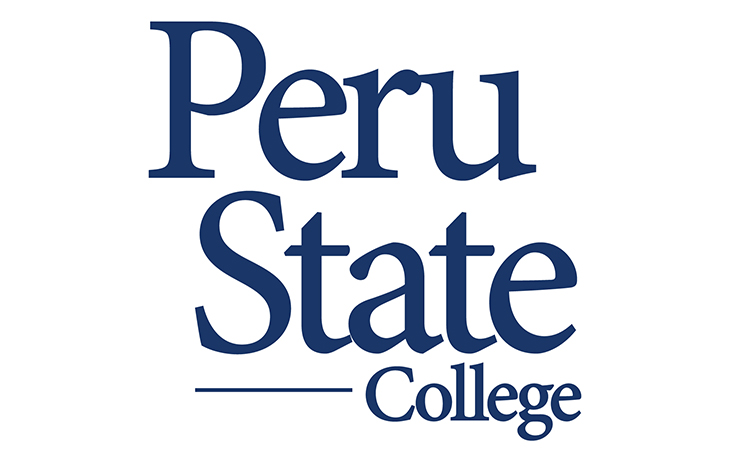FOR IMMEDIATE RELEASE
11:30 a.m. August 15, 2017
Jason R. Hogue, Director of Communications, Peru State College, jhogue@peru.edu, 402-872-2429
Peru, Nebraska - Dr. Spencer Davis, professor of history, has retired from Peru State College. His
last teaching semester was the spring of 2017 with an official end date in August.
In an e-mail about his tenure here, Davis writes, “I came to Peru State College in
the middle of the 1984 spring semester to fill an unexpected, temporary opening .
. . and stayed for 33 years!”
Dr. Dan Hanson, president of Peru State College said, “Spencer Davis is an excellent
example of the extraordinary faculty and staff Peru State depends on to engage students
academically in our communities. I am grateful Spencer is planning to continue his
involvement in our campus even after retirement.”
Davis earned his Bachelors in History from Brown University in 1968 and his Masters
in 19th Century American History from the University of Nebraska-Lincoln in 1972.
He received his Ph.D. in History, with an emphasis on Modern Britain, from the University
of Toronto in 1982.
“When I arrived a building program was beginning and each administration has overseen
continuous transformation. It’s been fun to watch and benefit from the substantial
improvements.”
Dr. Clyde Barrett, former vice president of academic affairs, writes, “Spencer was
a dedicated faculty member and Peru State was fortunate to have a professor of this
caliber serve for so many years.
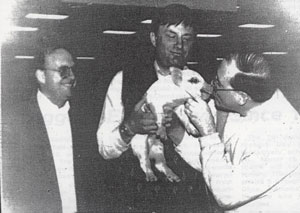
Davis "won" the chance to kiss a pig in 1991. Photo courtesy of the Peru State Times.
“I was fortunate in joining the Peru State faculty when the administration was encouraging
innovation. I was selected to be the first coordinator of the Honors Program,” Davis
continues, “I helped developed its curriculum and have taught Honors program courses
throughout my career.”
In a 1987 letter, former Peru State President, Dr. Jerry Gallentine, writes that Davis’
tireless effort “was instrumental in the development and the implementation of the
Honors Program at Peru State College.”
Davis appreciated teaching at Peru State because of the college’s openness to creating
new curriculum and courses.
“The part I enjoy is the freedom to teach different courses and to originate new courses,”
Davis said. “At bigger schools, professors were hired to be in a specific field. I
like that I can teach many different things and propose new courses if I want.”
While his teaching assignments at Peru State called largely for classes in American
history, Davis has taught a wide variety of history and social science classes in
the last 33 years, including Introduction to Philosophy, Modern Middle East, American
Political Thought, World Mythology, African American History, Modern Africa and more.
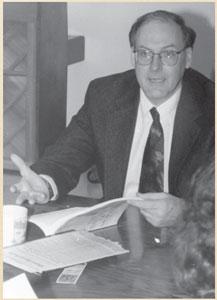
Davis teaching Introduction to Philosophy. Photo courtesy of the Peruvian and restored by the Omaha World-Herald.
“Some students wanted a course in African American history, and I was pleased to develop
it. To learn more about the subject I joined and then became a volunteer at the Great
Plains Black History Museum in Omaha, and it was there I met my wife Vivian.”
Former Vice President of Academic Affairs and Interim President, Dr. William Snyder,
wrote in 1991, “Prior to Dr. Davis, our curriculum was void of any course related
to the black experience. We now have several courses that offer all students a broader
understanding of our past. The courses are a result of his leadership.”
Dr. Anthony McCrann, former professor of English, writes, “ founded and chaired our Multi-Cultural Affairs Committee, a body paying special attention
to the needs of our minority students."
Snyder continues, “ scholarship is excellent, his commitment to the study of the black experience is evident,
and his interest level is apparent.”
Davis adds, “In later years I helped diversify the curriculum further by developing
courses in African history, Middle East history and World Mythology.”
“I have been fortunate in having energetic colleagues to join with and learn from
who believed in the curriculum beyond the classroom and brought speakers, plays, contests,
poets, politicians to campus. I like to think I played a part in that effort to create
a richer academic community on campus, and I benefited from some of the amazing trips
they planned.”
In his Education Philosophy, Davis wrote, “I believe that the history lectures must
interpret events, since events cannot be organized into a coherent narrative without
an interpretive framework. I also believe that—with care—history can provide useful
comparisons with current events.”
Since coming to Peru State, Davis has been greatly involved with college organizations
and community events. He served as an advisor for Phi Alpha Theta on campus and as
a Teacher Education Committee member.
He has also served as vice president of the Peru State College Education Association.
On occasion, Davis wrote columns for the Peru State Times as well.
Davis writes, “Faculty governance occupied a good part of my time at Peru State. I
served as the last chair of the Faculty Association and the first chair of the Faculty
Senate. Subsequently, I served two more terms as Faculty Senate chair.”
Dr. Sara Crook, professor of history, writes that Davis also spent many years as Nebraska
State Education Association (NSEA) Negotiator for Peru State, “Dr. Davis was always
the consummate professional and had the foresight to always think long term regarding
the negotiations.”
“He was always on point, philosophical and yet pragmatic. He had the ability to think
beyond the immediate issues and instead probed the long term consequences of any changes
to the contract. He was an advocate not just for the faculty, but also for the best
interest of Peru State and the State College System in general.”
Dr. Bill Clemente, professor of English, cites other Davis-led initiatives including
the creation of a faculty handbook and serving as the lead writer for an accreditation
visit. Davis’ efforts also included both co-chairing a reform of general education
with Dr. Bill Snyder and a second review of general education later.
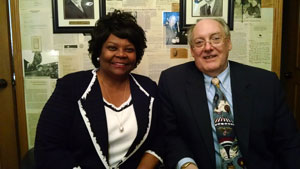
Dr. Davis with his wife, Vivian. Photo courtesy of the Nebraska State Historical Society Foundation.
Davis adds, “The strength of Peru State College is its faculty, dedicated to, and
genuinely enthusiastic about, full-time classroom teaching and their students.”
McCrann continues, “Davis is tireless in suggesting books and articles to his colleagues.
Somehow, amidst the endless meeting and details of our professional lives, he helps
our department to maintain its focus on the academic pursuits that join us together."
In Dan Sullivan’s book about the history of Peru State, former student Michelle Kaiser
said, “Dr. Davis is always able to recommend a book that will be helpful and insightful,
no matter what the topic in question.”
Davis’ education efforts extend to bringing area high school students to Peru State.
He has been a part of organizing Quiz Bowl and History Day for regional high schools.
The College’s “Quiz Bowl: A Competition of the Mind” was a double-elimination, academic
tournament in which teams of four competed against each other, answering questions
from all areas of a general, liberal arts education. The event lasted for more than
twenty years.
“I joined with several administrators to revise the Quiz Bowl for junior and senior
high schools that Peru State hosted and saw it grow steadily through the years it
existed.”
While Quiz Bowl is currently on hiatus, Peru State hosted its 33rd annual History
Day in the spring of 2017 where more than 300 students presented history projects.
Community members judged the projects and winners received prizes, scholarships and
some were eligible to compete at the state competition in Lincoln.
Crook adds, “Dr. Davis’ support and encouragement of the District History Day Contest
was unsparing – and crucial given our two-person department! He served as head judge
for most of the 33 years that Peru State has hosted the District History Day Contest
and he’s often volunteered to be a State History Day Judge, too.
Davis has also played a major role as a speaker at several national historical anniversaries
in local communities. His interest in all things historical extends to serving on
numerous groups and projects.
Barrett continues, " worked to promote [everyone's] interest in historical events through his participation in local, state and national
events."
Davis writes, “I arrived Peru State in time to participate in the Bicentennial of the Constitution (1987) and later in
the Bicentennial of Lincoln’s birth (2009), the Sesquicentennial of the Civil War
(2011) and currently the Centennial of WWI.”
Davis was also a member of the Sesquicentennial Executive Committee, planning events
at the college for the 150th anniversary. He also was a speaker for the Charter Day
Speaker Series.
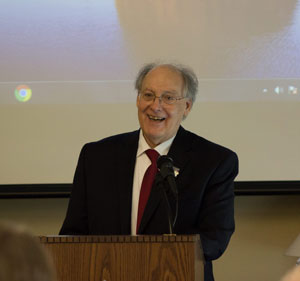
Dr. Davis speaking at Peru State's 150th Anniversary "Charter Day" in June.
“I was also fortunate in being on faculty for the sesquicentennial of the college.
It has been an honor to be a member of the Sesquicentennial Executive Committee and
contribute to its activities, in particular Charter Day.”
In the community, Davis served on multiple boards and worked with organizations, including
the Nebraska State Historical Society Board of Trustees, the Humanities Nebraska Speakers
Bureau, Mayhew Cabin and Museum, the Sarpy County Museum, the Great Plains Black History
Museum, Durham Museum, Papillion La Vista Library and Plattsmouth Chautauqua.
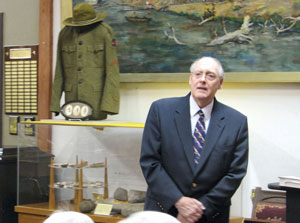
Davis speaking at the Sarpy County Museum on the reactions of prominent Nebraskans William Jennings Bryan, Willa Cather and Senator George Norris to entering World War I. Photo courtesy of the Omaha World-Herald.
When pressed about his retirement plans, Davis volunteers, “Kayaking, mountain-climbing,
or RAGBRAI are not in the cards. I hope instead to continue scholarly reading, writing
(my wife expects a book), participating in conferences and public service programs.”
“I also hope to continue attending Phi Alpha Theta programs and other programs on
campus.”
In reflection on his time at Peru State, Davis concludes, “I have been very, very
lucky. Lucky in the time I joined the faculty, lucky in talents and cooperation of
my colleagues, lucky in the student and public interest in the subjects I taught.”
“And most of all lucky in meeting my wife as part of faculty development!”
###
Ashley Peiman contributed to this release.
